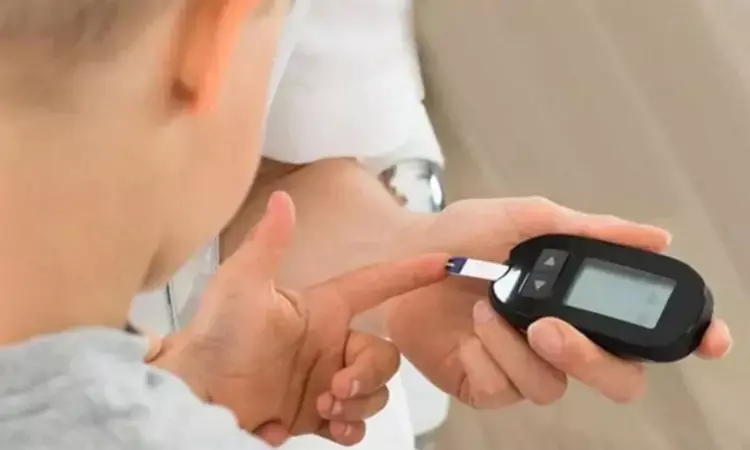- Home
- Medical news & Guidelines
- Anesthesiology
- Cardiology and CTVS
- Critical Care
- Dentistry
- Dermatology
- Diabetes and Endocrinology
- ENT
- Gastroenterology
- Medicine
- Nephrology
- Neurology
- Obstretics-Gynaecology
- Oncology
- Ophthalmology
- Orthopaedics
- Pediatrics-Neonatology
- Psychiatry
- Pulmonology
- Radiology
- Surgery
- Urology
- Laboratory Medicine
- Diet
- Nursing
- Paramedical
- Physiotherapy
- Health news
- Fact Check
- Bone Health Fact Check
- Brain Health Fact Check
- Cancer Related Fact Check
- Child Care Fact Check
- Dental and oral health fact check
- Diabetes and metabolic health fact check
- Diet and Nutrition Fact Check
- Eye and ENT Care Fact Check
- Fitness fact check
- Gut health fact check
- Heart health fact check
- Kidney health fact check
- Medical education fact check
- Men's health fact check
- Respiratory fact check
- Skin and hair care fact check
- Vaccine and Immunization fact check
- Women's health fact check
- AYUSH
- State News
- Andaman and Nicobar Islands
- Andhra Pradesh
- Arunachal Pradesh
- Assam
- Bihar
- Chandigarh
- Chattisgarh
- Dadra and Nagar Haveli
- Daman and Diu
- Delhi
- Goa
- Gujarat
- Haryana
- Himachal Pradesh
- Jammu & Kashmir
- Jharkhand
- Karnataka
- Kerala
- Ladakh
- Lakshadweep
- Madhya Pradesh
- Maharashtra
- Manipur
- Meghalaya
- Mizoram
- Nagaland
- Odisha
- Puducherry
- Punjab
- Rajasthan
- Sikkim
- Tamil Nadu
- Telangana
- Tripura
- Uttar Pradesh
- Uttrakhand
- West Bengal
- Medical Education
- Industry
Automated Insulin Delivery Systems Improve Glucose Control in Youth With Type 1 Diabetes: JAMA

Researchers have determined in a new study that the application of automated insulin delivery (AID) systems in children with type 1 diabetes (T1D) results in gains in blood glucose control, such as decreases in glycated hemoglobin (HbA1c), increases in time-in-range (TIR), and reductions in risks of both hyperglycemia and hypoglycemia. The study was published in JAMA Pediatrics by Hannah S. and colleagues.
A PRISMA-guided systematic review and meta-analysis was performed, with literature searched in MEDLINE, Embase, CINAHL, and Cochrane Central between January 2017 and March 2025. There were randomized clinical trials (RCTs) of youth aged 6 to 18 years with T1D comparing AID systems for over 48 hours in outpatient care with other insulin regimens. Screening, extraction, and quality assessments were conducted by two independent reviewers. Random-effects models were employed to calculate pooled efficacy results, with a main interest in HbA1c and TIR.
Results
After screening 2,363 accessed citations, 11 RCTs with 901 participants with available HbA1c data and 10 RCTs with 786 participants with available TIR data were included.
The average intervention duration was 31 weeks, and the median age of participants was 12 years (range 10.8–15.9 years).
Within participants, 51% were women, mean baseline HbA1c was 8.4% (SD 1.1%), and mean baseline TIR was 51% (SD 9%).
In comparison with conventional insulin regimens, AID systems lowered HbA1c by −0.41% (95% CI: −0.58% to −0.25%; I² = 39%) and increased TIR by 11.5% (95% CI: 9.3%–13.7%; I² = 23%).
Nighttime TIR rose by 19.7% (95% CI: 17.0%–22.4%; I² = 36%).
Moreover, AID use decreased hypoglycemia (<3.9 mmol/L) time by −0.32% (95% CI: −0.60% to −0.03%; I² = 18%) and hyperglycemia (>10 mmol/L) time by −10.8% (95% CI: −14.4% to −7.2%; I² = 55%), especially nocturnal (−14.4%; 95% CI: −19.9% to −8.9%; I² = 79%).
There were no differences in adverse events between groups, and only two studies included quality of life outcomes.
This review found that the application of AID systems among adolescents with type 1 diabetes improves glycemic control by decreasing HbA1c, improving TIR, and decreasing rates of hypoglycemia and hyperglycemia without inducing additional adverse events.
Reference:
de Visser HS, Waraich S, Chhabra M, et al. Automated Insulin Delivery Systems and Glucose Management in Children and Adolescents With Type 1 Diabetes: A Systematic Review and Meta-Analysis. JAMA Pediatr. Published online September 08, 2025. doi:10.1001/jamapediatrics.2025.2740
Dr Riya Dave has completed dentistry from Gujarat University in 2022. She is a dentist and accomplished medical and scientific writer known for her commitment to bridging the gap between clinical expertise and accessible healthcare information. She has been actively involved in writing blogs related to health and wellness.
Dr Kamal Kant Kohli-MBBS, DTCD- a chest specialist with more than 30 years of practice and a flair for writing clinical articles, Dr Kamal Kant Kohli joined Medical Dialogues as a Chief Editor of Medical News. Besides writing articles, as an editor, he proofreads and verifies all the medical content published on Medical Dialogues including those coming from journals, studies,medical conferences,guidelines etc. Email: drkohli@medicaldialogues.in. Contact no. 011-43720751


